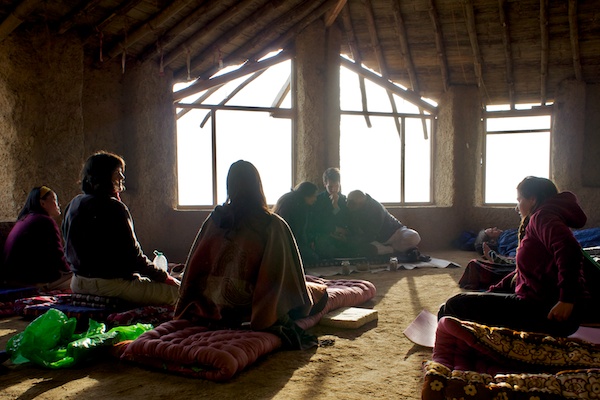What: “Subtle Consciousness Meditation” Retreat
Where: Deer Park Institute, Bir
When: 4-9 December, 2013
Who: Ven. Sudhammacara
This ‘Subtle Consciousness Meditation Retreat’ is based on the One Dharma Meditation Method compiled by Ven. Sudhammacara. It consists of three kinds of practice: mindfulness of body sensation, compassion meditation and ana-pana sati (mindfulness of in-breath and out-breath).
These practices enable us to dwell in the present moment. Here and now, we gradually uncover our Subtle Consciousness which is usually clouded by our deluded, non-stop thinking. We go back to our true home with peace and joy after travelling abroad painfully so many years.In the end, we are finally discovering who we really are.
These intensive silent retreats will include regular sessions of sitting and walking meditation, accompanied by Dharma teachings and personal guidance. The retreats are open to both beginners and experienced meditators. From this year, the retreat will include Yoga classes. These will be led by Reiko Azuma, who has been teaching Yoga in Ven. Sudhammacara’s meditation retreats in Japan and Taiwan. Meditators get much benefit from Yoga exercises.
Guests and visitors who are not able to attend the whole retreat may attend some sessions only, but are requested to maintain silence around the meditation hall and dining area, to support the retreatants.
Teacher: Ven. Sudhammacara
Ven.Sudhammacara was ordained in the Japanese Soto Zen tradition in 1983, under Kosho Uchiyama Roshi lineage. He practiced and taught zazen meditation for more than 18 years, including several years spent teaching at Valley Zendo in Massachusetts, USA.
In 2001, he took Theravadan Bhikku ordination in the Burmese forest monk tradition under Pa-Auk Sayadaw, and trained in shamatha (calm abiding) and vipassana (insight) meditation in Burma and Sri Lanka. Since 2006, he has also been exposed to the Tibetan Buddhist tradition. Now he calls himself One Dharma Buddhist monk.
Ven. Sudhammacara has been a regular visiting teacher at Deer Park, where he offers mindfulness meditation retreats, since autumn 2007. Most of the year, he lives in Kamakura, Japan, where he teaches meditation at his centre Ippo-an (One Dharma Forum). He also leads meditation retreats in several sacred places (Kyoto, Kudaka-jima and Mitake-san) in Japan.
Ven. Sudhammacara brings experience from the Japanese Zen tradition, the Theravada forest tradition of Burma, and the Tibetan Buddhist tradition. Ven.Sudhammacara’s vast experience has shown him the pitfalls of commonly practiced meditations. His careful avoidance of Buddhist terms that can easily slip into jargon, makes retreatants rethink or let go of Buddhist conceptualizations (that many often automatically rely on, thinking they already understand the meaning without renewed consideration).
As well as this five-day silent mindfulness retreat, Ven Sudhammacara will also lead daily meditations and Dharma talks at Deer Park in early December.
For information: www.deerpark.in/programs/schedule/subtle-consciousness-meditation-retreat/


You must be logged in to post a comment.